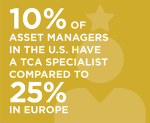Although headcounts among institutional trading desks held steady from 2018 to 2019, it’s clear that increases in buy-side trading desk budgets are being driven by technology spending.
Press Releases
The same tailwinds that fueled the spread of transaction cost analysis (TCA) among institutional investors in Europe after the passage of new regulations are expected to arrive in the United States in 2020.
Improved Cross-Border Access, Increased Competition Biggest Requests of Derivatives Market Participants
March 11, 2020
Running a truly global business is inherently complex, and having to operate within multiple layers of redundant regulations is increasingly complex for derivatives market participants.
Greenwich Associates Announces 2020 Greenwich Leaders in European Large Corporate Banking and Cash Management
March 3, 2020
The combination of macroeconomic volatility, slow economic growth, historically low interest rates, and further KYC requirements has created valuable opportunities for banks.
Greenwich Associates Announces 2020 Greenwich Leaders in Asian Large Corporate Banking and Cash Management
March 3, 2020
Macroeconomic volatility in Asia could actually be working to the advantage of the world’s biggest corporate banks.
Corporate treasury departments are increasingly being asked to take on a greater role as strategic advisor to the business as a whole.
CRISIL completes Greenwich acquisition
February 26, 2020
CRISIL has completed the acquisition of 100% stake in Greenwich Associates LLC (‘Greenwich’) today.
More than half of institutional investors in North America and Europe believe their asset managers are falling short in terms of technology.
In New Era of Zero-Commission Trades, Equity Brokers Maintaining Both Execution Quality and Service Levels
February 25, 2020
Brokers have every incentive to maintain execution quality and to continue providing top-notch client service, research and other tools as trading commissions become a smaller part of overall revenue.
Fixed-income dealers’ response to long-term challenges facing the industry could be working to the advantage of global investors.
Pages
Media Contact
Media Inquiry
Awards
- 2025 Coalition Greenwich Awards: Corporate Trade Finance in Europe
- 2025 Coalition Greenwich Awards: Asian Corporate Trade Finance
- 2025 Coalition Greenwich Awards: Corporate and Commercial Banking in India
- Investment consulting: A relationship business in a transactional world
- 2025 Coalition Greenwich Leaders: Middle Market Banking in the U.S.









